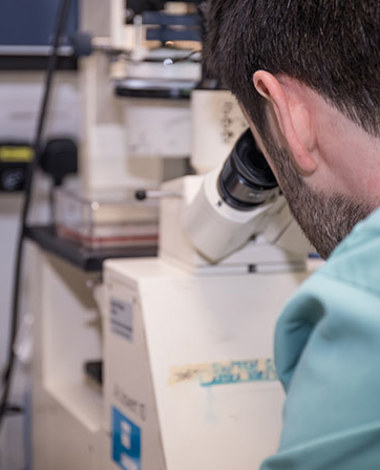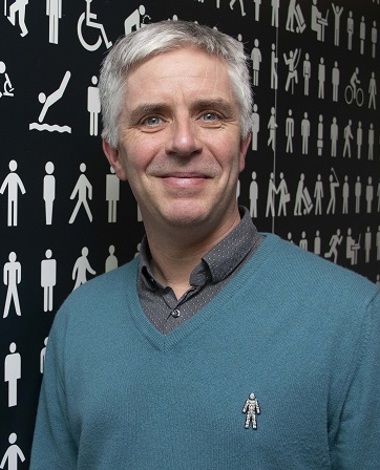Preventing the progression of prostate cancer
Preventing the progression of prostate cancer
For more than 20 years, it has been thought that a man’s risk of developing prostate cancer might be linked to levels of certain hormones that regulate growth, called Insulin-like Growth Factors (IGFs). This idea inspired the late Professor Val Macaulay - a brilliant and pioneering clinical researcher at the University of Oxford - to investigate whether targeting IGFs could lead to a new treatment for prostate cancer.
Since 2004, thanks to your support, we funded Professor Macaulay and her team’s research. Your support has helped take the work from the initial idea and early lab experiments through to the WINGMEN trial, conducted by Professor Macaulay and her team at Oxford, and subsequently continued by Professor Ian Mills.
In the WINGMEN trial, men with localised prostate cancer - where the cancer has not spread outside the prostate - received a new treatment that blocks IGF. This drug was given through a drip into a vein just before surgery to remove their prostate. This allowed the research team at Oxford to test blood and prostate biopsy samples taken before and after surgery. They hoped to see whether blocking IGF could reduce the levels of this hormone and stop the cancer from growing.
Excitingly, the results showed that the treatment can safely lower IGF levels and slow tumour growth. The drug was well tolerated by the men in the trial. Researchers are now exploring similar drugs that block IGF and can be taken as a tablet, which could make treatment easier for men. The next step will be a larger trial in men with early-stage prostate cancer to see if the treatment can help stop their cancer from becoming more aggressive early on.

Some of my patients ask to visit the lab, because it’s just next door to the hospital. When they come in, they can see the scientists using the same drug they are having, to test effects on prostate cancer cells in the lab. This is very interesting for the patients, and also inspiring for the scientists who may not have had the opportunity to talk to people with cancer.

Graham Rooms, 55 from Exeter, was diagnosed with prostate cancer in 2019, after he was prompted to visit to his GP following an awareness talk at work. He said: "The weekend that followed my diagnosis felt very dark. I never thought something like this would happen to me."
Thankfully, although my cancer was aggressive, I caught it early. I had surgery to remove my prostate and I now do all I can to raise awareness of this disease and money to help fund vital research. I hope this research can give more men the chance that I have had, by stopping their cancer from becoming more aggressive early on.”
From research idea to access for all


Idea
The team worked to understand how a hormone called IGF affects the growth and progression of prostate cancer. They wanted to find out whether an IGF-blocking drug could lower IGF levels in men with localised prostate cancer and whether this could help slow tumour growth and stop the cancer from getting worse.

Lab research
Early research showed that having high levels of IGF might increase the chance of getting prostate cancer. Before the trial in men, the Oxford team studied how IGF sends signals that encourage prostate cancer cells to grow and whether a drug that blocks IGF could slow cancer growth. Many of these tests were done on cancer cells grown in the lab.

Clinical trial
In the WINGMEN trial, an early-stage 'window' trial, 26 men with localised prostate cancer received an IGF-blocking treatment through a drip before their prostate cancer was surgically removed. The results showed the treatment was safe, lowered IGF levels, slowed tumour growth, and was well tolerated by the men.
To take this research further, a larger trial will be needed to confirm how well this works in a larger number of men. The researchers are exploring whether this could be in the form of an oral tablet, rather than an IV drip, as this would make the treatment easier for men to take.

Approved for use
The evidence from the WINGMEN trial is highly encouraging, but larger trials will be needed to confirm the treatment’s safety and effectiveness in men with localised prostate cancer. If these future studies are successful, the Medicines and Healthcare Products Regulatory Agency (MHRA) would review the results to decide whether the treatment could be made available to men across the UK. If approved, it could then be licensed for use.

Access for all
If this new form of treatment can be shown to be effective in larger trials, we would work with key decision makers to ensure the treatment is available to men across the country.
What's next?
We've continued to support bold, innovative research into better treatments for men with prostate cancer. This includes projects aiming to understand the process of treatment resistance, how to treat prostate cancer more precisely and how to use natural mechanisms of cell death to selectively kill cancer cells.
With your help we can give men more time
Help us fund vital research into better treatments for men with prostate cancer, giving men more options and more time with their loved ones.




